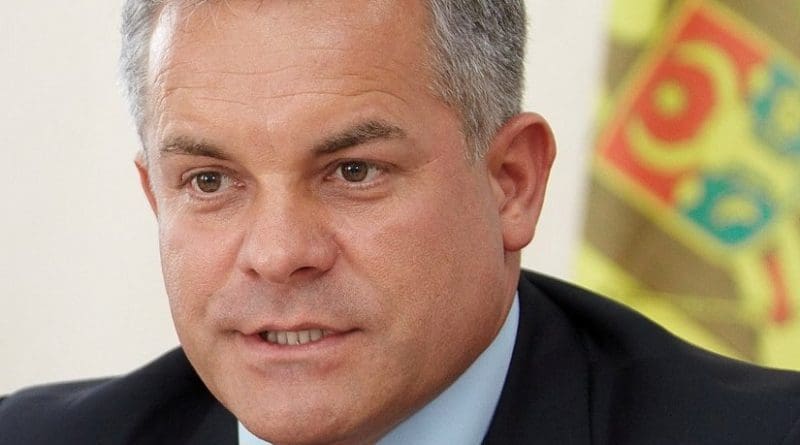Moldova: Mystery Surrounds Assassination Plot – Analysis
By Ana Maria Touma
The attempted assassination of Moldova’s richest and most controversial politician, Vladimir Plahotniuc, has left a number of questions unanswered.
Moldova and Ukraine jointly detained 17 people last week suspected of plotting to assassinate Vladimir Plahotniuc, one of Moldova’s richest and most powerful politicians.
Vitalie Busuioc, of the Moldovan Prosecutor’s Office for Organized Crime, on Saturday said they had seized money and weapons, including grenade launchers, that were to be used in the plot to kill Plahotniuc, a businessman who is also the chair of the Democratic Party, the largest partner in Moldova’s pro-European governing coalition.
A day before, Ukraine’s Interior Ministry said that the authorities in Kiev had thwarted an assassination attempt against Plahotniuc and had arrested nine people.
Ion Iachimov, from the Moldovan National Investigation Inspectorate, said two Moldovans, one of whom is in Moscow, had ordered the murder in exchange for $200,000. The alleged assassins had already received half of the money.
The Democratic Party said it “firmly condemned this criminal act” but did not comment on who might be behind it.
The assassination claim comes as Plahotniuc’s Democratic Party is in the middle of a campaign promoting a new system of plurality elections to replace the proportional system. Analysts say the affair also comes as the Moldovan businessman tries to shed his “oligarch” image.
The editor-in-chief of the Chisinau-based Evenimentul Zilei daily, Madalin Necsutu, told BIRN that the details of the plot raised important questions.
The perpetrators were photographed drawing a plan of attack over the Global Business Center in Chisinau where Plahotniuc has his office, but Necsutu said it was unlikely that real professional assassins would do such a thing.
“Plahotniuc is really well guarded in Chisinau: he has his own bulletproof car and professional security company. I don’t think these guys drawing plans in the sand would be able to get to him,” Necsutu explained.
“However, Ukraine’s involvement gives credibility to the entire affair,” he added.
Long mired in controversy:
Plahotniuc, 51, officially entered politics in 2010, after supporting Moldovan opposition parties.
He rarely gives interviews but on his blog says he wants Moldova to stop being led by communist ideology and wants “foreign businesspeople to stop speaking to me about our communist regime”.
He served two terms as MP, and was First Deputy Speaker on parliament. He resigned as an MP in January 2015, saying he wanted to reform the Democratic Party.
Plahotniuc is also founder of the Edelweiss Foundation, which is involved in implementing various social projects in Moldova. He is also a friend of Ukrainian President Petro Poroshenko, who has visited Plahotniuc’s foundation and its projects.
He runs companies in oil, financial and banking, hotel business, media and real estate. Plahotniuc officially owns four television channels and three radio stations.
His wealth was put at $300 million dollars, as stated by Ukrainian business magazine Delo in August 2010. The money reportedly originated from activities in both Victoriabank and Petrom Moldova, where he acted as Deputy Chairman of the Board of Directors.
Plahotniuc has been nicknamed the “master puppeteer” due to accusations of influence peddling and involvement in controversial affairs.
After a billion dollars disappeared from three major Moldovan Banks in 2012-2014, Mihai Gofman, then deputy director of the country’s anti-graft and money laundry watchdog CNA, told Forbes that he believed Plahotniuc had facilitated the theft.
Plahotniuc denied this claim and said he was cooperating with the investigation.
During the 2015–16 protests in Moldova, amid a worsening economic situation and corruption scandals, public street protesters picketed the Global Business Center, where Plahotniuc’s companies have their headquarters.
He says he has been misunderstood. “I am not a perfect person, but I am also not the man my political adversaries say I am. I was accused of all the evils on earth, the most outrageous lies have been invented,” he wrote on his biography published on the website.
Rebranding efforts:
Necsutu says Plahotniuc has been working hard lately to convince Brussels that he and his party are the ones carrying the European Union banner in Chisinau, and oppose Russia, adding that Moscow resents the businessman.
He says that many political analysts appearing on TV channels owned by Plahotniuc noted that he had been declared undesirable by Moscow.
“His popularity is very low and he has the image of a controversial character who pulls the strings from the shadows.
“But since January 2016, when he publicly expressed his wish to become Prime Minister, Plahotniuc has been working on his image as an honest politician: he positioned himself as the coordinator of the pro-European parliamentary majority and he also became the leader of the PD after a unanimous vote. All these moves are part of an internal rebranding campaign,” he explained.
The assassination plot could contribute a great deal to these efforts, Necsutu continued.
“We could talk about a campaign of victimizing Plahotniuc as an opponent of Russia to gain sympathy from Brussels but also on the domestic scene. Basically, kill two birds with one stone,” he pointed out.

